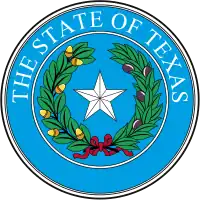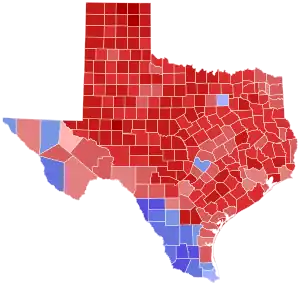2010 Texas elections
Elections were held in Texas on Tuesday, November 2, 2010. Primary elections were held on March 2, 2010.
| ||
|
| ||
| Elections in Texas |
|---|
 |
|
|
The Republican Party continued its dominance over Texas politics, maintaining control of all statewide offices and increasing its majorities in both chambers of the Texas Legislature. The GOP also picked up control of three additional seats in the United States House of Representatives.
Federal
United States House of Representatives
All 32 Texas seats in the United States House of Representatives were up for election in 2010.
State
Governor
Incumbent Republican Governor Rick Perry ran for re-election against Democratic challenger and former mayor of Houston Bill White and several third-party candidates, and won.
Lieutenant governor
Incumbent Republican Lieutenant Governor David Dewhurst ran for re-election and won.
Attorney general
| |||||||||||||||||
| |||||||||||||||||
 County results Abbott: 40-50% 50-60% 60-70% 70-80% 80-90% 90-100% Radnofsky: 40-50% 50-60% 60-70% 70-80% 80-90% 80-90% | |||||||||||||||||
| |||||||||||||||||
Incumbent Republican Greg Abbott ran for re-election as Texas Attorney General against Democrat Barbara Ann Radnofsky and Libertarian candidate Jon Roland, and won.
State senate
Approximately half of the 31 seats of the Texas Senate were up for election in 2010.
State House of Representatives
All 150 seats in the Texas House of Representatives were up for election in 2010. The GOP captured 99 seats (a record), including 22 that were held by Democrats after the 2008 Texas House of Representatives election. This left the Democrats with 51 seats. Edmund Kuempel, the incumbent GOP candidate for District 44 seat, subsequently died; the seat was filled by special election on December 14 and won by his son, John, also a Republican. Also on December 14, two Democrats (Allan Ritter and Aaron Peña) announced they were switching parties and joining the Republicans, thus giving the GOP 101 seats, and a 2/3 majority in the House, giving them considerable leverage.[1][2] Under Texas law, any bill which passes with 2/3 of both legislative chambers can become effective immediately upon the governor's signature (otherwise a bill does not become effective until September 1, the start of Texas' fiscal year). This also meant that the Democrats could not quorum bust, or deprive the House of the 2/3 of members required for operation.[3]
Other state offices
Elections were held for the positions of Comptroller of Public Accounts, Commissioner of General Land Office, Commissioner of Agriculture, and Railroad Commissioner in 2010.
Legislative elections
Texas House of Representatives
| Affiliation | Party (Shading indicates majority caucus) |
Total | ||
|---|---|---|---|---|
| Republican | Democratic | Vacant | ||
| Beginning of the 81st legislature | 76 | 74 | 150 | 0 |
| Before 2010 elections | 77 | 72 | 149 | 1 |
| Voting share | 51% | 48% | ||
| After 2010 elections | 99 | 51 | 150 | 0 |
| Beginning of the 82nd legislature | 101 | 49 | 150 | 0 |
| Voting share | 67% | 33% | ||
Texas Senate
| Affiliation | Party (Shading indicates majority caucus) |
Total | ||
|---|---|---|---|---|
| Republican | Democratic | Vacant | ||
| Before 2010 elections | 19 | 12 | 31 | 0 |
| Voting share | 61% | 39% | ||
| After 2010 elections | 19 | 12 | 31 | 0 |
| Voting share | 61% | 39% | ||
Judicial positions
Multiple judicial positions were up for election in 2010, including three justices on the Texas Supreme Court.
Ballot measures
There are no statewide ballot measures in Texas in 2010.
Local
Many elections for county and city offices were also be held on November 2, 2010.
References
- Ramsey, Ross (December 12, 2010). "TribBlog: Ritter Confirms He's Switching Parties". The Texas Tribune. Retrieved December 30, 2021.
- Hamilton, Reeve (December 14, 2010). "TribBlog: Peña on Party Switching". The Texas Tribune. Retrieved January 15, 2022.
- "THE TEXAS CONSTITUTION ARTICLE 3. LEGISLATIVE DEPARTMENT". statutes.capitol.texas.gov. Retrieved January 15, 2022.
External links
- Elections Division of the Texas Secretary of State
- Texas Candidate List at Imagine Election - Search for candidates by address or zip code
- Texas Congressional Races in 2010 for campaign finance data for federal races from OpenSecrets
- Texas State Races in 2010 campaign finance data for state races from Follow the Money

